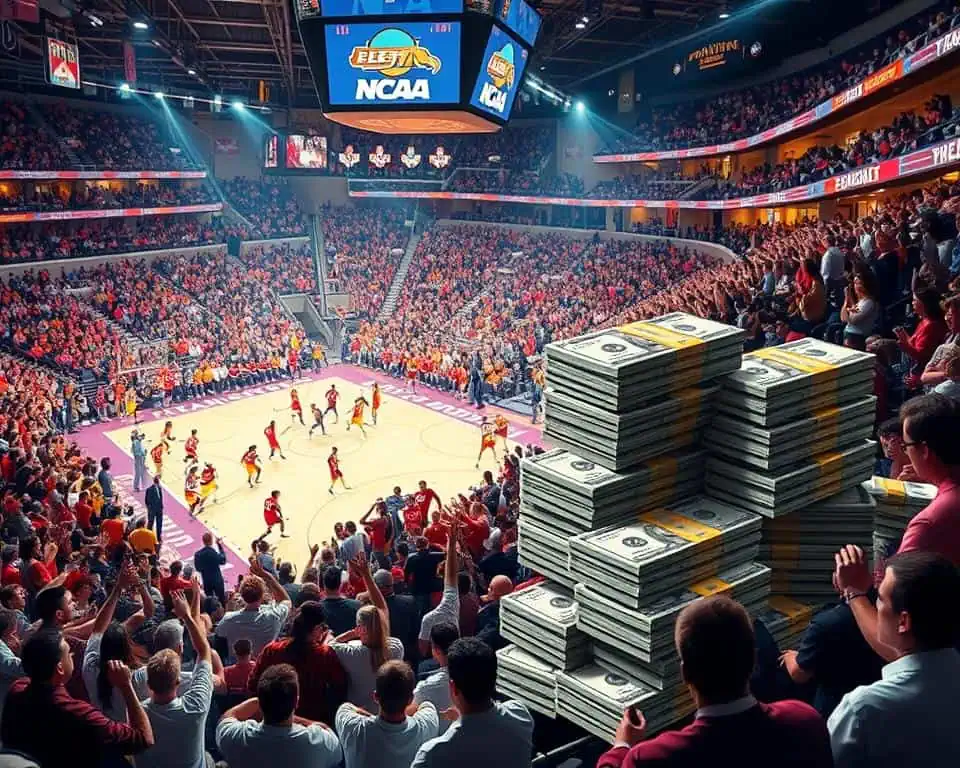The debate about NCAA compensation for college athletes is very popular. As college sports make more money, many think athletes should get a part of it. But, others worry that paying athletes could hurt amateur sports.
This article will look into the debate. We will talk about the arguments for and against paying athletes. We will also discuss how to make sure everyone in college sports is treated fairly, including the role of athletic scholarships and the need for fair pay.

Key Takeaways
- The controversy surrounding paying college athletes has been ongoing for years
- Proponents argue that student-athletes deserve a share of the growing revenues in college sports
- Opponents believe that paying athletes would undermine the integrity of amateur sports
- Athletic scholarships are a key component of the current compensation model for college athletes
- Finding a fair pay solution is crucial to ensuring the rights of student-athletes are protected
The Controversy Surrounding Paying College Athletes
For decades, people have argued about paying college athletes. They wonder if it’s fair and if college sports should be amateur. With more money coming in, many think it’s time to pay the athletes for their hard work.
Arguments in Favor of Paying College Athletes
Those who want to pay athletes say they work hard and face financial problems. They spend a lot of time practicing and playing, but still struggle to pay for things. This makes it hard for them to focus on school too.
Also, supporters say athletes should get some of the money they help make. College sports bring in billions, but the athletes don’t get any of it. They are the ones who make it all happen.
“College athletes are the ones putting their bodies on the line, entertaining millions of fans, and generating massive profits for their universities. It’s only fair that they receive a piece of the pie.” – Former NBA player and current analyst, Jay Bilas
Arguments Against Paying College Athletes
Those against paying athletes say it would ruin college sports. They think college is for learning, not just for sports. Paying athletes would make them focus more on money than school.
They also worry about fairness. If schools with more money could pay athletes, it would be unfair. This could make games less competitive and less fun to watch.
“Paying college athletes would destroy the integrity of college sports. It would create a system where the richest schools can simply buy their way to championships, leaving smaller programs unable to compete.” – NCAA President, Mark Emmert
The debate on paying college athletes is very complex. It’s hard to find a solution that everyone agrees on. But the discussion keeps going, trying to find a fair way for all.
The Impact of Paying College Athletes on Universities and Sports Programs
The debate on paying college athletes is growing. It’s important to think about how it will affect universities and sports. Universities will have to look at their budgets to see if they can pay athletes fairly.
Universities also need to think about Title IX. This law makes sure men and women have equal chances in sports. Any payment plan must follow this law to be fair to all athletes.
Paying athletes could change how universities recruit. Schools with more money might get better players. This could make some sports programs better than others.
“Paying college athletes has the potential to fundamentally change the nature of college sports, and universities must be prepared to navigate the complex financial, legal, and competitive implications of such a significant shift in the landscape.”
Universities have a lot to think about if they start paying athletes. Here are some key things they need to consider:
- Creating a fair pay system that fits their budget
- Following Title IX to ensure equal chances for all athletes
- Changing how they recruit players to stay competitive
- Thinking about how it will affect team spirit and the college sports experience
| Area of Impact | Key Considerations |
|---|---|
| Financial Implications | Budget allocation, sustainability, and potential impact on other university programs |
| Title IX Compliance | Ensuring equal opportunities and compensation for male and female athletes |
| Recruiting Practices | Adapting strategies to remain competitive in a new landscape |
| Competitive Landscape | Potential widening gap between well-funded and resource-limited programs |
Universities need to talk openly about paying athletes. They should listen to athletes, coaches, and others. By thinking carefully, they can make college sports fairer and better for everyone.
Exploring Alternative Compensation Models for College Athletes
The debate on paying college athletes is growing. We need to look at new ways to help them financially. This way, we can make sure they get support without hurting college sports.
Scholarships and Grants
One idea is to make scholarships and grants better. This would help athletes pay for school and living costs. It lets them focus on school and sports without money worries.
Universities could offer more scholarships and grants. This shows they care about athletes’ success and well-being.
Endorsement Deals and Sponsorships
College athletes could make money from their fame. They could get deals and sponsorships. This way, they can earn extra money from their fame.
Universities could watch over these deals. This makes sure athletes get fair pay without losing the amateur spirit of college sports.
Trust Funds and Deferred Compensation
Another idea is trust funds or deferred pay. A part of sports money goes to athletes later. This helps them after school.
This plan helps athletes plan for the future. It encourages them to focus on education and success. Looking into these models helps find a fair way to support athletes while keeping college sports amateur.











